Eastern
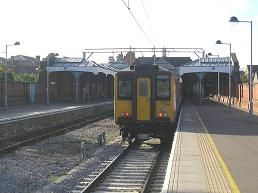 |
Liverpool Street train at Hertford East railway station |
Broxbourne to Hertford East
Name of Line: The Hertford East Line
Length of Line:
Train Operating Company: Abellio Greater Anglia
Stations: Broxbourne, Rye House, St Margaret's, Ware, Hertford East
Description: This branch line leaves the Cambridge mainline soon after Broxbourne and goes west along the Ware valley to Hertford.
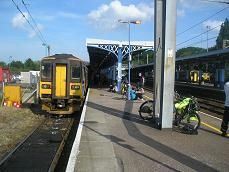 |
Ipswich railway ststion - Cambridge train |
Cambridge to Ipswich
Name of Line:
Length of Line:
Stations: Cambridge, Dullingham, Newmarket, Kennett, Bury St. Edmunds, Thurston, Elmswell, Stowmarket, Needham Market, Ipswich
Train Operating Company: Abellio Greater Anglia
Description:
History
Journey review - coming soon
Trivia:
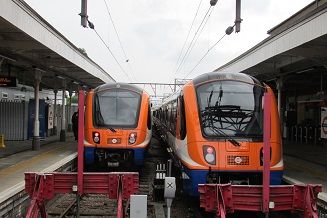 |
Chingford Railway Station in 2021 |
Clapton to Chingford
Name of Line: The Lea Valley Line (one of three)
Length of Line:
Stations: Clapton, St James Street, Walthamstow Central, Wood Street, Highams Park, Chingford
Train Operating Company: Abellio Greater Anglia
Description: The line leaves the main Liverpool Street to Cambridge line soon after Clapton, before cutting across hackney marshes before passing through the town of Walthamstow. It finally ends at Chingford just before the Greater London border reaches Essex.
Trivia: This route used to have the nickname of "The Jazz Service"
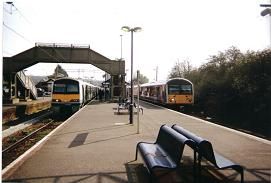 |
Thorpe-le-Soken railway station - Clacton and Walton trains |
Colchester to Clacton & Walton-on-the-Naze
Name of Line: The Sunshine Coast Line
Length of Line:
Stations: Colchester, Colchester Town, Hythe, Wivenhoe, Alresford, Great Bentley, Thorpe-le-Soken, Kirby Cross, Frinton, Walton-on-Naze/ Clacton
Train Operating Company: Abellio Greater Anglia
Description: This branch line off the Great Eastern mainline first passes right through the centre of the ancient town of Colchester before going eastwards to the North Sea coast. At Thorpe-le-Soken the line splits in two, with one branch going to the large seaside town of Clacton-on-Sea, whilst the other branch goes to the more sedate Walton-on-the-Naze.
History: The railway to Clacton was first opened in 1882. The line was first electrified in 1959 but not completed all the way to London (70 miles away) until 1962.
Trivia: Colchester Town station was originally called "St Boltophs" after the church next to the station.
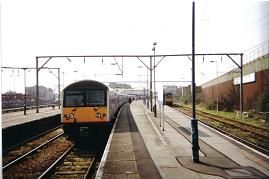
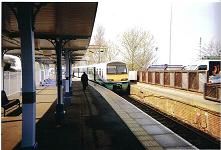
Clacton Railway Station Walton-on-the-Naze railway station
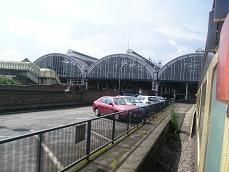 |
Darlington railway station north end |
Darlington to Bishop Auckland
Name Line: The Tees Valley Line
Length of Line: 12 miles
Stations: Darlington, North Road, Heighington, Newton Aycliffe, Shildon, Bishop Auckland
Train Operating Company: Northern
Trains start at: Saltburn, Middlesborough, Darlington
Description: This branch line goes in a north westerly direction from Darlington to Bishop Auckland on the eastern edge of the Pennines. It passes through Shildon where the "Locomotion" museum is situated.
History: This branch line forms part of the original Stockton and Darlington railway line which was opened in 1825. At first freight trains went from Stockton-on-Tees to Witton Park Colliery near Shildon. In 1833 regular passenger trains first travelled on the route. The section north to Bishop Auckland was opened in 1843. Then by 1895 the line had reached beyond Bishop Auckland up the Wer Valley to Eastgate. In the early 1900's the line was electrified between Shildon and Newton Aycliff, though by 1933 the electrification was ended. The beeching cuts of the 1960's swa many lines in this area closed to passenger traffic, though the section between Darlington and Bishop Auckland was saved.
Websites: Locomotion Weardale Railway Darlington Railway Centre
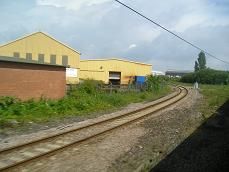
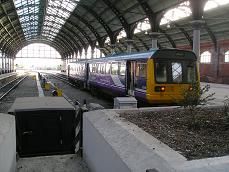
Bishop Auckland branch leaving the ECML Darlington Railway Station facing south
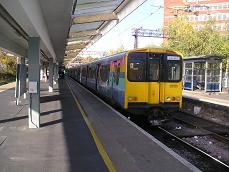 |
Enfield Town railway station |
Edmonton Green to Enfield Town
Name of Line: The Lea Valley Line (part of)
Length of Line: 2 miles
Stations: Edmonton Green, Bush Hill Park, Enfield Town
Train Operating Company: Abellio Greater Anglia
Description: This short branch off the main line to Cambridge out of Liverpool Street has just one station on its branch at Bush Hill Park.
History
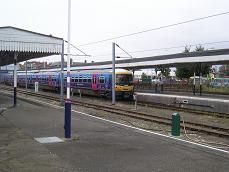 |
Kings Lynn railway station |
Ely to Kings Lynn
Name of Line:
Length of Line:
Stations: Ely, Littleport, Downham Market, Watlington, Kings Lynn
Train Operating Company: Great Northern
Description:
History:
Journey review - coming soon
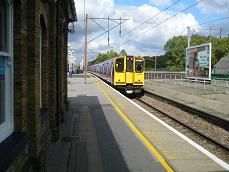 |
Moorgate train coming into Finsbury Park railway station |
Finsbury Park to Moorgate
Name of Line:
Length of Line:
Stations: Finsbury Park, Drayton Park, Highbury & Islington, Essex Road, Moorgate
Train Operating Company: Great Northern
Description: This busy commuter branch leaves the East Coast mainline at Finsbury Park and apart from a short open-air stretch to Drayton Park is underground for most of its route. It changes from using overhead power to third rail at Drayton Park.
History: This mainly underground branchline was first opened in 1904 as the Great Northern and City Railway. At times it belonged to London transport and at other times British Railways. In August 1976 through trains from the northern suburbs of London and beyond started using this line after it had previously belonged to London Underground. More
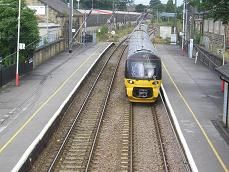 |
Bradford train at Guiseley railway station 4/9/09 |
Guiseley to Bradford Forster Square
Name of Line: The Wharfedale Line
Length of Line:
Stations: Guiseley, Baildon, Shipley, Frizinghall, Bradford Forster Square
Train Operating Company: Northern
Description: The Southe western part of the Wharefdale Line runs north from industrial Bradford to the edge of the Yorkshire Dales at Guiseley
History:
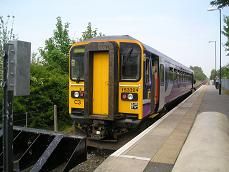 |
Barton-on-Humber railway station |
Habrough to Barton-on-Humber
Name of Line: The Barton Line
Length of Line: 11 1/4 miles
Train Operating Company: Northern
Stations: Habrough, Ulceby, Thornton Abbey, Goxhill, New Holland, Barrow Haven, Barton-on-Humber
Frequency of Trains: One every two hours
Rolling Stock: Class 153 Super Sprinter
Trains start from: Cleethorpes
Description: This branch line leaves the main Cleethorpes to Barnetby line at Habrough and goes north to New Holland and then west to Barton-on-Humber, where there is a bus connection to Hull via the Humber Bridge.
History: The line was first opened in 1849 as part of the Great Central Railway. In 2007 the line was designated as a community rail line by the Department of Transport.
Web links: Friends of The Barton Line - http://www.bartonrail.org.uk/ Barton to Cleethorpes Community Rail Partnership - http://www.bccrp.co.uk/
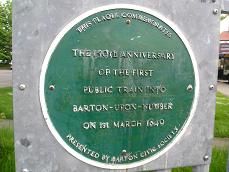
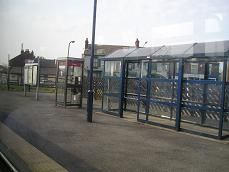
150th anniversary plaque at Barton station Harbrough railway station
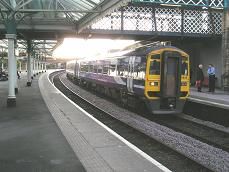 |
Scarborough train at Bridlington railway station |
Hull to Scarborough
Name of Line: The Yorkshire Coast Line
Length of Line: 53 miles
Stations: Hull, Cottingham, Beverley, Arram, Hurtton Cranswick, Driffield, Nafferton, Bridlington, Bempton, Hunmanby, Filey, Seamer, Scarborough
Train Operating Company: Northern
Description; The line runs roughly north from the port of Hull in the south through the East Yorkshire Wolds and along coast to the seaside resort of Scarborough in the north.
Trivia: There used to be a small branch line from Filey to Butlins Filey Holiday Camp until the line closed in 1977
Links:- Yorkshire Coast Community Rail Partnership Yorkshire Coast Line
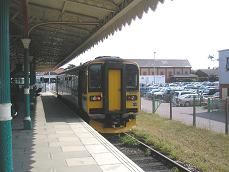 |
Felixstowe railway station |
Ipswich to Felixstowe
Name of Line: The Felixstowe Branch Line
Length of Line - 12 miles
Stations: Ipswich, Westerfield, Derby Road, Trimley, Felixstowe
Train Operating Company: Abellio Greater Anglia
History: The line was the brainchild of Colonel George Tomline, a local landowner, whose Felixstowe Railway and Pier Company, opened its line from Westerfield to Felixstowe Pier in May 1877. In 1887 the Great Eastern Railway absorbed the line and built an extension to Felixstowe Town in 1898. In the first half of the twentieth century the line became popular with hoildaymakers, with summer specials from the Midlands and London. From the 1960's on Felixstowe docks grew rapidly as a result of the container revolution, increasing freight traffic on ther line. there are plans to double the line due to the amount of traffic on the line.
Description: The line goes almost in a circle round Ipswich before leaving the Suffolk line at Westefield and going South Eastwards along a busy single track line to Felixstowe Town, past the massive container port on the right.
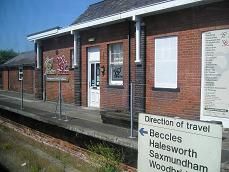 |
Oulton Broad South - old station |
Ipswich to Lowestoft
Name of Line: The East Suffolk Line
Length of Line:
Stations: Ipswich, Westerfield, Woodbridge, Melton, Wickham Market, Saxmundham, Darsham, Halesworth, Brampton, Beccles, Oulton Broad South, Lowestoft
Train Operating Company: Abellio Greater Anglia
Description - This picturesque line travels north-east through the east Suffolk countryside passing through several quaint market towns before it crosses into Norfork and moves east to the coast at Lowestoft.
Websites: The East Suffolk Line
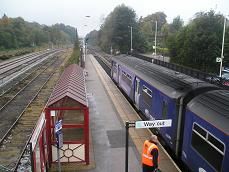 |
Knottingley railway station looking west |
Knottingley to Wakefield Kirkgate
Name of Line: The Pontefract Line (part of)
Length of Line: 10 miles
Stations: Knottingley, Pontefract Monkhill, Pontefract Tanshelf, Featherstone, Streethouse, Wakefield Kirkgate
Train Operating Company: Northern
Description: This is just one of many minor lines to the south of Leeds in a former mining area.
History
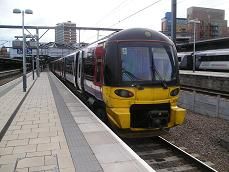 |
Ilkley train at Leeds railway station 4/9/09 |
Leeds to Ilkley
Name of Line: The Wharfedale Line
Length of Line:
Train Operating Company: Northern
Stations: Guisley, Menston, Burley-in-Wharfedale, Ben Rhydding, Ilkley
Description: This picturesque line runs northwestwards friom Leeds out into the Yorkshire Dales.
History: The line to Ilkley was first opened in 1865. It was electrified in 1995.
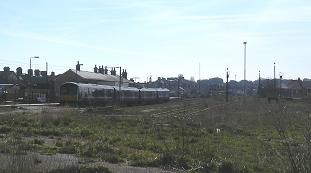 |
Harwich Town railway station in 2007 |
Manningtree to Harwich Town
Name of Line: The Mayflower Line
Length of Line:
Stations: Manningtree, Mistley, Wrabness, Harwich International, Dovercourt, Harwich Town
Train Operating Company: Abellio Greater Anglia
Description: This branch line leaves the Great Eastern mainline to Norwich at Manningtree where it follows the southern edge of the River Stour estuary until it comes to Parkeston Quay Docks. It then continues along the coast into Harwich Town where the line terminates.
History: Railway first opened in 1854. Then in 1879 the Great Eastern Railway began to reclaim land to the west of the town which eventually became Parkeston Quay and succeeded in overtaking nearby Ipswich as the main port for sailing to Holland from. In 1925 the LNER started a train ferry service from Harwich to the Hook of Holland, carrying mainly perishable goods trains. In 1968 a container port was opened at Harwich. In 1986 the line was finally electrified from Manningtree to Harwich Town.
Trivia: Maningtree station has the reputation as being one of the windiest railway stations in the whole of Britain!
Websites:
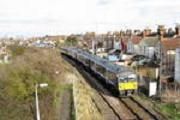
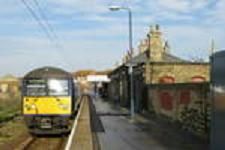
London train arriving at Dovercourt Harwich Town station
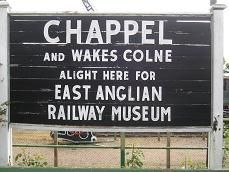 |
Chappel & Wakes Colne railway station sign |
Marks Tey to Sudbury
Names of Line: The Gainsborough Line / The Sudbury Line / The Stour Valley Line
Length of Line: 12 miles
Stations: Marks Tey, Chappel & Wakes Colne, Bures, Sudbury
Train Operating Company: Abellio Greater Anglia
Description: This branch line goes from Mark's Tey in Essex, on the Great Eastern Main Line to Sudbury in Suffolk, a market town famous as being the birthplace of artist Thomas Gainsborough. It passes through the valley of the River Stour in some of England's most beautiful countryside. Much of this area was painted by the artist John Constable. Chappel and Wakes Colne station is the home of the East Anglian Railway Museum and the station here is a recreation of a 1930's rural station.
History: The line originally went all the way from Mark's Tey through to Cambridge via Sudbury, Long Melford and Bury St Edmunds, with a branch going off to Haverhill and Cambridge at Chapel and Wakes Colne. The single line to Sudbury was opened on 2nd July 1849 with Cambridge being reached in 1865. By 1962 all the lines north of Sudbury had been closed, but the line has survived to this day and is popular with commuters and tourists alike. More
Nearby places of interest:
Trivia: The footbridge at Chappel and Wakes Colne station was originally the one at Sudbury station.
Websites: The Sudbury Line The Gainsborough Line Bures on-line Cambridge to Sudbury Railway Renewal Association Photo link
Nearby places of Interest: Sudbury Long Melford Melford Hall Kentwell Hall
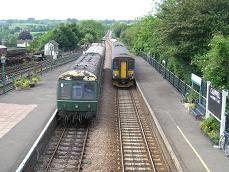 |
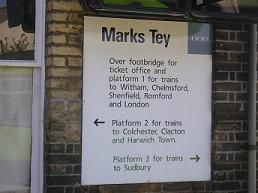 |
|
Chappel & Wakes Colne Station |
Station sign at Marks Tey station |
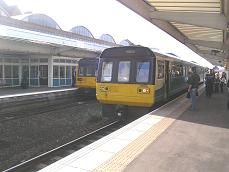 |
Saltburn train at Middlesborough railway station |
Middlesbrough to Saltburn
Name of Line: Tees Valley Line
Train Operating Company: Northern
Length of line:
Stations: Middlesbrough, South Bank, British Steel Redcar, Redcar Central, Redcar East, Longbeck, Marske, Saltburn
Description: The line moves eastwards from the heavily industrialised landscape around Middlesbrough towards the North Sea coastline and the seaside town of Saltburn.
History:
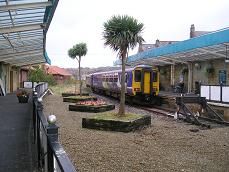 |
Whitby railway station - Middlesborough train |
Middlesbrough to Whitby
Name of Line: The Esk Valley Line
Train Operating Company: Northern
Length of line: 35 miles
Stations: Middlesborough, Marton, Gypsy Lane, Nunthorpe, Grest Ayton, Battersby, Kildale, Commondale, Castleton Moor, Danby, Lealholm, Glaisdale, Egton, Grosmont, Sleights, Ruswarp, Whitby
Description: From the industrial scenery of Teeside, through the North York Moors to the North Sea Coast at Whitby, this fascinating branchline has it all. Steam trains of the North York Moors railway now run right through to Whitby from Pickering, joining the line at Grosmont in the summer months.
History: The eastern section of the branch was the first to be opened. This was the Whitby & Pickering Railway which opened as early as 1836. The next section of this branch, between Middlesbrough and Nunthorpe was opened in 1854, as part of the Middlesbrough & Guisborough Railway. Then in 1865 the North Yorkshire & Cleveland Railway opened the section of line between Battersby and Grossmont. The final section between Nunthorpe and Battersby was opned in 1868.
Wesbite links: North York Moors Railway
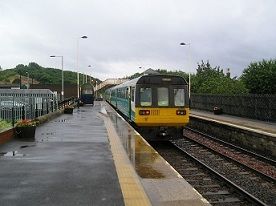 |
Hexham train at Prudhoe railway station |
Newcastle to Carlisle
Names of Line: The Tyne Valley Line / The Hadrian's Wall Line
Length of Line: 40 miles
Stations: Newcastle, Dunstan, Metro Centre, Blaydon, Wylam, Prudhoe, Stocksfield, Riding Mill, Corbridge, Hexham, Haydon Bridge, Bardon Mill, Haltwhistle, Brampton, Wetheral, Carlisle
Train Operating Company: Northern
Trains start at: Newcastle, Sunderland, Middlesborough, Carlisle, Stranraer
Description: This line goes right across the "top" of England through the Pennine Hills, from Newcastle to Carlisle, following the valley of the river Tyne for much of its route.
History: The complete line was first opened in 1839, making it one of the earliest railway lines in the country
Journey review
Links: Tyne Valley Community Rail Partnership Tyne Valley Rail Line Users Group
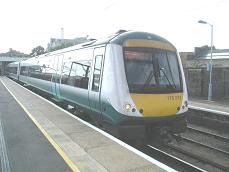 |
Norwich train at Cambridge railway station |
Norwich to Cambridge
Name of Line: The Breckland Line
Length of Line:
Stations: Norwich, Wymondham, Spooner Row, Attleborough, Eccles Road, Harling Road, Thetford, Brandon, Lakenheath, Shippea Hill, Ely, Waterbeach, Cambridge
Train Operating Company: Abellio Greater Anglia
Description:
History:
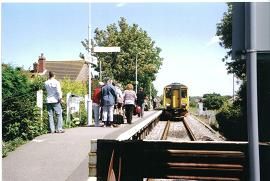 |
Sheringham railway station - train from Norwich approaching |
Norwich to Cromer/Sheringham
Name of Line: The Bittern Line
Train Operating Company: Abellio Greater Anglia
Stations: Norwich, Salhouse, Hoverton & Wroxham, Worstead, North Walsham, Gunton, Roughton Road, Cromer, West Runton, Sheringham
Description: This community railway line travels north from Norwich, through the North Norfolk countryside where the Norfolk Broads are situated, before reaching the coast at Cromer. The train reverses here and then runs westward along the coast to Sheringham where it terminates next to the North Norfolk Railway.
History
Websites: The Bittern Line North Norfolk Railway Bure Valley Railway
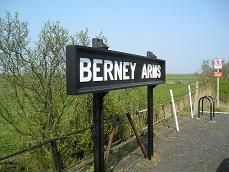 |
Berney Arms railway station |
Norwich to Great Yarmouth
Name of Line: The Wherry Line
Length of Line -
Stations: Route 1 - Norwich, Brundall Gardens, Brundall, Buckenham, Cantley, Reedham, Berney Arms, Great Yarmouth
Stations: Route 2 - Norwich, Brundall Gardens, Brundall, Lingwood, Acle, Great Yarmouth
Train Operating Company: Abellio Greater Anglia
History: The line was opened on 1st May 1844, having been engineered by George and Robert Stephenson. This was the very first railway line from Norwich to anywhere else in Norfolk. (Norwich wasn't actually connected to London by rail until 1845 and only then via Cambridge). The original line wasn't the most direct and had to go north east from Reedham across the marshes. The owner would only allow a railway to cross his land on condition that a station had to be built in the middle of the marshes for trains to stop daily there in perpetuity. This station is Berney Arms and has no road connection to it, but trains do stop there on request every day.
Description
Trivia: Berney Arms station is believed to be the only station in England which cannot be reached by road.
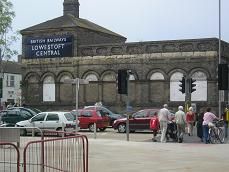 |
Lowestoft railway station - original sign |
Norwich to Lowestoft
Name of Line: The Wherry Line
Length of Line:
Train Operating Company: Abellio Greater Anglia
Stations: Norwich, Brundall Gardens, Brundall, Buckenham, Cantley, Reedham, Haddiscoe, Somerleyton, Oulton Broad North, Lowestoft
Description: The line goes in an easterly direction from Norwich across some very flat land, before it leaves the Yarmouth line at Reedham and moves in a south easterly direction where it reaches the Suffolk coast at Lowestoft.
History
Trivia: Lowestoft railway station is the most easterly station in the whole of Britain.
Websites: The Wherry Lines Photolink
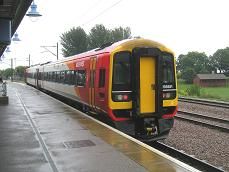 |
A South West Trains unit at Ely Railway Station August 2008 |
Peterborough to Ely
Name of Line:
Length of Line:
Stations: Peterborough, Whittlesea, March, Manea, Ely
Train Operating Companies: Abellio Greater Anglia Cross Country East Midlands Trains
Description:
History:
Journey review
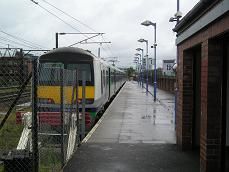 |
Upminster train at Romford railway station |
Romford to Upminster
Name of Line: The Romford to Upminster Line
Length of line: 3 1/4 miles
Stations: Romford, Emerson Park, Upminster
Train Operating Company: Abellio Greater Anglia
Description: A single-track branch line on the outer edges of London. It links the Great Eastern mainline out of Liverpool Street with the Fenchurch Street to Southend line. The track is surrounded for much of its route by suburban housing, with the occasional swathe of greenery.
History: This branch line was originally opened in June 1893 by the London, Tilbury & Southend Railway Company. It was electrified in the 1980's.
Websites:
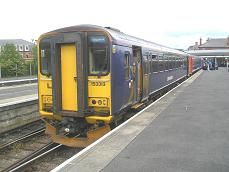 |
Nottingham Train at Skegness Railway Station |
Sleaford to Skegness
Name of Line: The Poacher Line
Length of Line: 40 miles
Stations: Sleaford, Heckington, Swineshead, Hubbert's Bridge, Boston, Thorpe Culvert, Wainfleeet, Havenhouse, Skegness
Train Operating Company: East Midlands Trains
Description: This line passes through some of the flattest land in Britain, over the northern fens, which were once sea.
Traction used: Class 156 DMUs
Trains start at: Nottingham and Grantham
History: The line from Boston to Louth was opened in 1848. The line south from Boston to Grantham was opened in 1855 and the last section from Wainfleet to Skegness was first opened in 1873.
Trivia: The line north of Boston is the second longest stretch of straight railway line in England
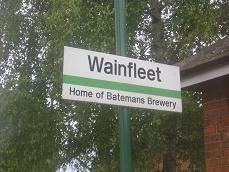
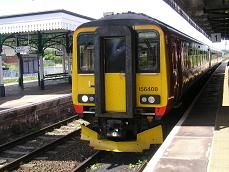
Wainfleet station sign Skegness train at Sleaford station
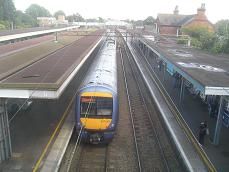 |
Grays train leaving Upminster railway station |
Upminster to Grays
Names of Line: The Upminster to Grays Branch / The Ockendon Branch
Length of Line:
Stations: Upminster, Ockendon, Chafford Hundred, Grays
Train Operating Company: c2c
Description: This single-track line has grown in popularity in recent years with the growth of the Lakeside Retail Park west of Grays, whose station is the new Chafford Hundred station. The journey goes through the first piece of greenbelt to the east of London, but soon rejoins the urban landscape after Ockendon, as it comes into the Grays area. Through trains from Fenchurch Street to Southend via Tilbury now use this route, whereas before they used to start and terminate at Upminster, the start of London Transport's District line.
History
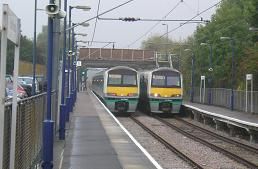 |
Shenfield and Southminster trains passing at North Fambridge Railway Station |
Wickford to Southminster
Names of Line: The Southminster Branch Line / The Crouch Valley Line
Length of line: 16 1/2 miles
Stations: Wickford, Battlesbridge, Woodham Ferrers, Fambridge, Althorne, Burnham-on-Crouch, Southminster
Train Operating Company: Abellio Greater Anglia
Description: This branch line off the Liverpool Street to Southend Victoria line starts at the commuter town of Wickford, near Basildon and follows the valley of the River Crouch to Burnham-on-Sea, before turning north to the village of Southminster, not far from Bradwell nuclear power station.
Trains start from: London Liverpool Street, Shenfield, Wickford
History: The first stage of this line was the opening of the railway to Burnham which was completed in 1889. Due to the area north of Burnham being rich in sand deposits the line to Southminster was opened a few years later. The line was electrified in 1986.
Websites: Southminster branch line Crouch Valley Line Photolink
Mangapps Railway Museum Bradwell Nuclear Power Station
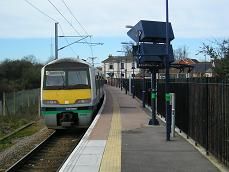 |
London train at Braintree railway station |
Witham to Braintree
Name of Line: The Braintree Branch
Length of Line: 6 miles
Stations: Witham, White Notley, Cressing, Braintree Freeport, Braintree
Train Operating Company: Abellio Greater Anglia
Description: The line leaves the Great Eastern Mainline at Witham and travels in a north westerly direction, parallel with Pod's Brook, a tributary of the Blackwater. It terminates at Braintree, a town situated half way between Bishop's Stortford and Colchester.
History: The line was originally opened in 1869 running east from Bishops Stortford via Braintree to Witham. The line west of Braintree closed in 1969. The line was electrified in 1977, allowing through trains to run from Liverpool Street.
Websites: Colne Valley Railway Cressing Temple Braintree Freeport Braintree
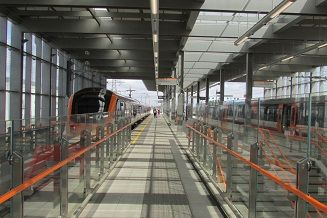 |
Barking to Barking Riverside
